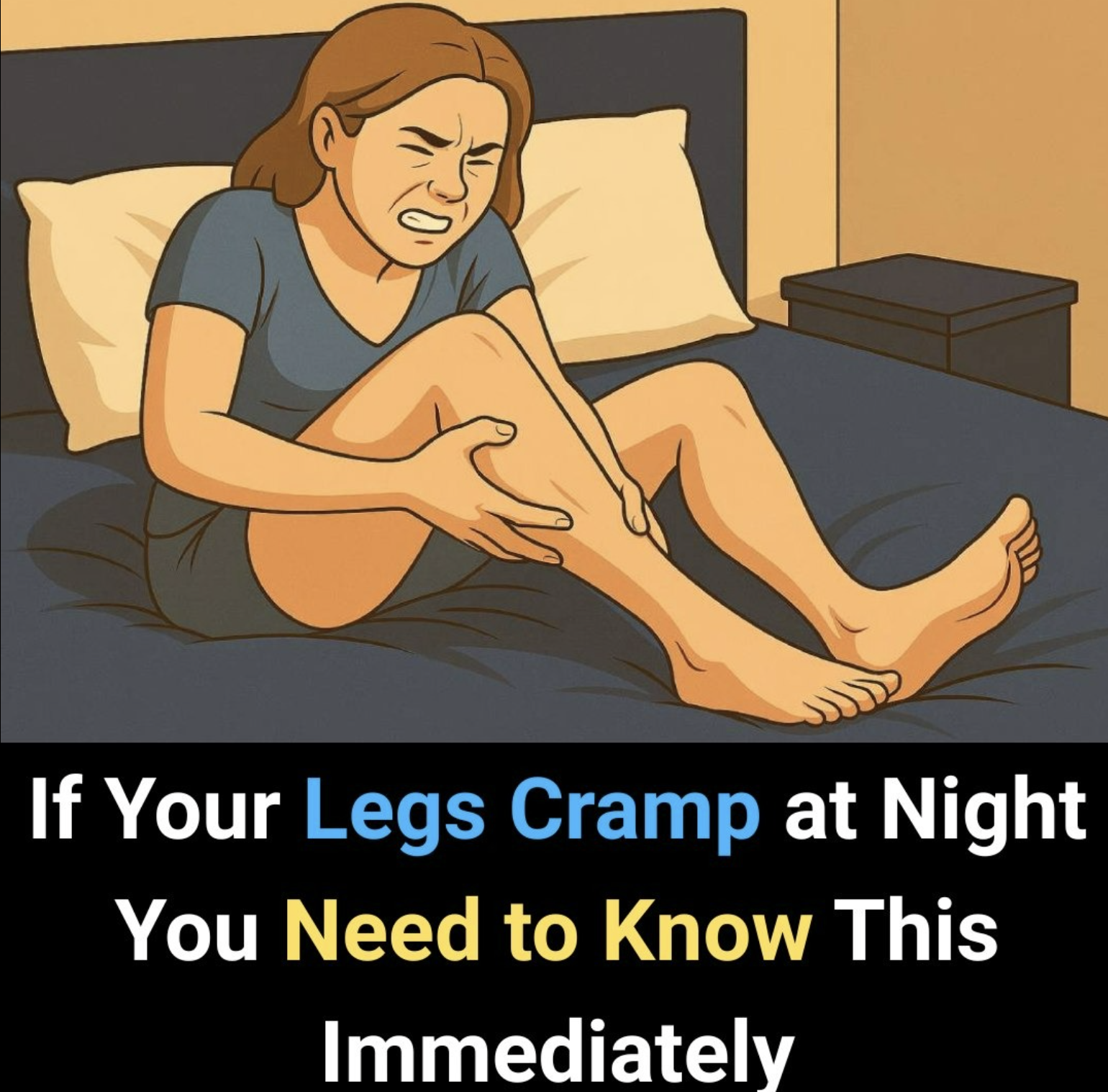Nocturnal leg cramps are sudden, involuntary contractions of the calf, foot, or thigh muscles — usually striking when you’re resting or asleep.
They can last seconds… or minutes.
And sometimes, the soreness lingers long after.
While not dangerous for most, they can be a sign of underlying imbalances — from dehydration to nerve issues.
✅ Key difference:
Leg cramps = painful muscle tightening
Restless Legs Syndrome (RLS) = an urge to move, often with crawling sensations — not pain
🔍 Common Causes of Nighttime Leg Cramps
1. Muscle Fatigue or Overuse
After long walks, intense workouts, or standing all day
Muscles become tired and more prone to spasms at night
✅ Fix: Stretch after activity. Don’t overdo it.
2. Dehydration
Even mild dehydration changes electrolyte balance
Low levels of sodium, potassium, calcium, or magnesium can trigger cramps
✅ Clue: Cramps after sweating heavily or in hot weather.
3. Electrolyte Imbalance
Diuretics (water pills), diuretic herbs, or poor diet can deplete key minerals
Magnesium deficiency is a common culprit — linked to muscle tension and cramping
✅ Tip: Eat bananas, spinach, nuts, and avocados — or consider a magnesium supplement (talk to your doctor first).
4. Sedentary Lifestyle
Sitting or standing still for long periods reduces circulation
Muscles stiffen — then spasm when you finally relax
✅ Common in office workers, drivers, and retirees.
5. Medications
Some common drugs increase cramp risk:
Diuretics (for high blood pressure) — flush out potassium and magnesium
Statins (cholesterol meds) — known to cause muscle pain and cramps
Birth control pills — hormonal shifts affect fluid balance
Asthma medications — like albuterol, which can lower potassium
✅ If cramps started after a new prescription — talk to your doctor.
6. Pregnancy
Especially in the second and third trimesters
Extra weight, hormonal changes, and pressure on nerves increase risk
✅ Good news: Usually resolves after delivery.
7. Underlying Health Conditions
While most cramps are harmless, some are linked to:
Diabetes
Nerve damage (neuropathy) affects muscle control
Peripheral Artery Disease (PAD)
Poor blood flow to legs
Thyroid disorders
Imbalanced metabolism affects muscles
Kidney disease
Electrolyte imbalances
Neurological conditions
MS, Parkinson’s, ALS — disrupt nerve signals
✅ If cramps are frequent or worsening — see a doctor.
🛡️ How to Prevent Night Cramps (Start Tonight)
✅
Stretch before bed
Calf stretches reduce risk — try the “wall stretch”
✅
Stay hydrated
Dehydration concentrates electrolytes — drink water all day
✅
Balance your electrolytes
Magnesium, potassium, calcium — eat bananas, spinach, nuts
✅
Move during the day
Walk, stretch, avoid long stillness
✅
Wear supportive shoes
Poor arch support stresses calf muscles
✅
Keep legs warm at night
Cold muscles cramp more easily — use light blankets
🧘♀️ 3 Simple Bedtime Stretches to Try
Calf Stretch (Wall Lean)
Stand facing a wall, hands on wall
Step one foot back, heel down
Lean forward until you feel a stretch in the calf
Hold 30 seconds, switch sides
Seated Forward Bend
Sit on floor, legs straight
Reach toward toes (don’t force it)
Hold 30 seconds — stretches hamstrings and calves
Towel Stretch (In Bed)
Lie on back, loop a towel around the ball of your foot
Gently pull toes toward you
Hold 20–30 seconds
✅ Do these nightly — even if you’re not cramping yet.
💊 Natural Support: Magnesium & More
Magnesium glycinate or citrate
Most effective for muscle relaxation — 200–400 mg at bedtime
Potassium-rich foods
Bananas, sweet potatoes, avocado
Calcium + Vitamin D
Supports muscle function — especially if deficient
✅ Talk to your doctor before starting supplements — especially if on medication.
🚨 When to See a Doctor
While most leg cramps are harmless, seek medical advice if you have:
Frequent or severe cramps (multiple times per week)
Muscle weakness or swelling
Numbness or tingling
Cramps without exertion
Symptoms that don’t improve with self-care
👉 These could signal nerve, circulation, or metabolic issues.
💬 Final Thoughts: You Don’t Have to “Just Live With It”
We accept night cramps as “normal.”
We say, “It’s just aging.”
We suffer in silence.
But the truth is:
Frequent night cramps are not normal.
They’re a signal.
Your body is saying:
“I need more magnesium.”
“My circulation is weak.”
“I need to move more.”
So if you’re being jolted awake by pain…
Don’t ignore it.
Stretch. Hydrate. Check your meds.
See a doctor if it’s severe.
Because sometimes, the difference between “I can’t sleep” and “I slept through the night”…
Isn’t in the pillow.
It’s in the calf.
And once you take action?
You might just get your rest — and your peace — back.
